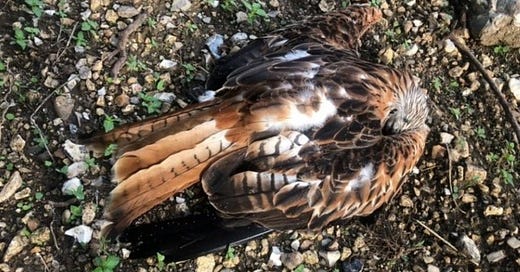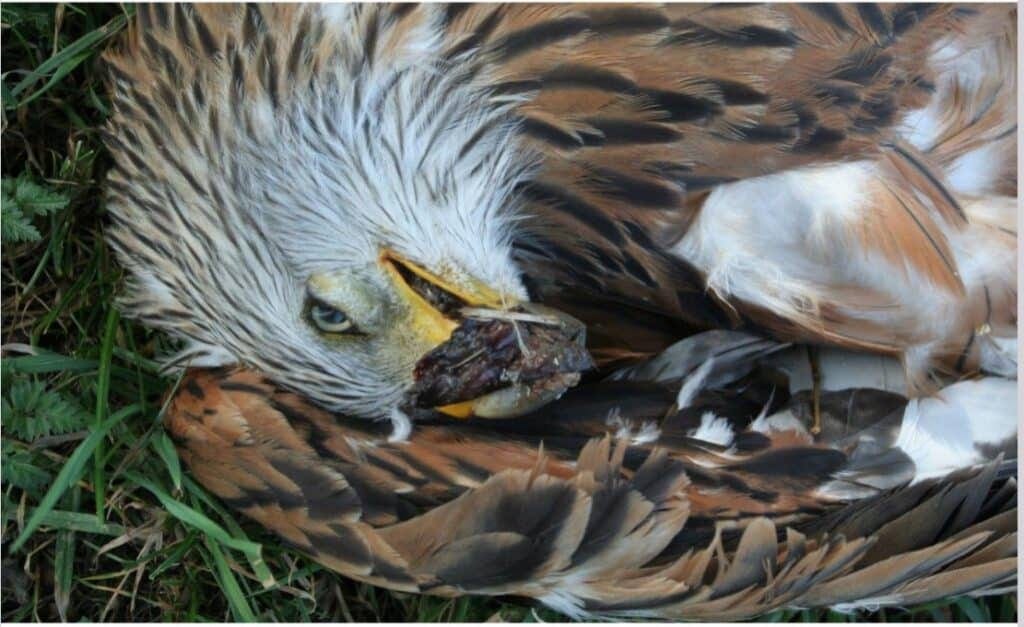Police in Norfolk are appealing for information after tests revealed a Red Kite discovered dead in North Creake had died from suspected insecticide poisoning.
Officers from Norfolk Police’s Operation Randall team have been investigating the death of the protected bird of prey, which was found by a member of the public in a field in North Creake in August 2023 with no obvious physical injuries (eg gunshot wounds or collision with overhead wires).
Because it was not clear how the kite had died, further tests were ordered. A post-mortem examination carried out at the end of November through the Wildlife Incident Investigation Scheme (WIIS) - which makes enquiries into the death or illness of wildlife, pets and beneficial invertebrates that may have resulted from pesticide poisoning - detected a number of pesticides and insecticides, including very high levels of Bendiocarb which has been concluded as the likely cause of death.
Wildlife officer PC Chris Shelley is quoted on the Norfolk Police website saying:
"[We] now know the levels of Bendiocarb contained within the samples taken from the bird have not come from the approved use of such a product.
“I have to conclude that this product has been used illegally in very close proximity to where the bird was recovered."
What is bendiocarb?
All birds of prey are protected by law, and the laying of poison baits in the open countryside has been illegal for over 100 years. Birds are still being poisoned though. The RSPB Birdcrime report noted 36 poisonings in the UK in 2021 (victims included 12 Common Buzzards, 10 Red Kites, two Peregrines, one Golden Eagle, and one White-tailed Eagle), and there have been 64 confirmed incidents of abuse of banned or highly toxic chemicals to target birds of prey in Northern Ireland alone since 2009.
As the RSPB’s highly experienced investigator Guy Shorrock wrote in November 2021, “we are still a long way from removing the cancer of illegal poisoning from our countryside“, adding that bendiocarb “has increasingly become the poisoner’s weapon of choice”.
But what is bendiocarb? As we explain in our Protectors of the Wild page on Poisoning and Poisoned Baits, Bendiocarb is an acutely toxic carbamate insecticide used in public health and agriculture against a wide range of disease vector insects (it is used in malaria control, for example).
Pure bendiocarb is highly toxic to birds (and to important pollinators including honey bees). It is so toxic that it has been banned in Scotland since 2005 and even possession is considered a serious offence. In England, bendiocarb is licenced for (diluted) use as an ingredient in a number of products, but they are intended for the indoor control of certain insects such as ants and wasps.
Poisoned Red Kite. North Yorkshire Police
If benidiocarb is meant to be used indoors how are birds of prey like Red Kites ingesting it?
By feeding on poisoned baits – often pheasant or rabbit carcasses split open and dosed with poison – left in the open by gamekeepers or landowners to attract and illegally kill birds of prey.
Carrion-feeding birds of prey are especially vulnerable to poisoned baits, and sadly, this Red Kite joins a list of raptors poisoned with Bendiocarb in the last five years that includes:
– a Red Kite poisoned in North Yorkshire in March 2019 with Bendiocarb and Isofenphos (Northern England Raptor Forum)
– a Red Kite found poisoned near Scarmpston, North Yorkshire in April 2020: tests found a combination of Brodifacoum and Bendiocarb. (Northern England Raptor Forum)
– a Buzzard killed in Nidderdale by a combination of pesticides including Bendiocarb (three pesticides were found in the buzzard’s gizzard and crop with a fourth detected in the bird’s kidney).
– an adult Peregrine found dead on top of the remains of a Wood Pigeon in May 2020 on National Trust land in the Upper Derwent Valley (see Peregrine poisoned in Peak District National Park).
– a young Peregrine found poisoned near Barnsley in July 2020 ( RSPB Community Our Work).
– a young White-tailed Eagle from the Isle of Wight reintroduction scheme found dead on a shooting estate in West Sussex in October 2021.
– two White-tailed Eagles found poisoned on a grouse moor in Northern Ireland in May 2023.
What should we do if we find a dead bird of prey that may have been poisoned?
It's clear that had the member of the public who found this bird NOT reported it to the police, this incident would have never been recorded. It is critical that any suspicious death of a bird of prey is reported to the police (on 999) or to RSPB Investigations (on 0300 999 0101) as quickly as possible (before the corpse disintegrates and any poisons are leached away into the soil).
Not every dead bird of prey we find will have been poisoned of course. Avian Flu has been found in birds of prey such as Peregrine Falcon, Hen Harrier, Buzzard, White-tailed Eagle and Golden Eagle, and of course sometimes birds simply die and their bodies are found soon after. However any unmarked bird of prey that is found lying dead for no apparent reason - especially near a shooting estate - may have been poisoned and a crime committed.
If that is the case, photograph the body and report it.
Another reaction might be to pick up the body 'for evidence'. Please note that we should NOT be picking up dead raptors without being extremely careful. Please DO NOT TOUCH ANYTHING with your bare hands. Modern poisons like bendiocarb or carbofuran are extremely dangerous. Just a few grains or granules will kill a bird of prey by breaking down its nervous system, and the poison can be quickly absorbed through our own skin.
We've given advice on our Protectors page about how to Recognise, Record, and Report Poisonings and Poisoned Baits
(Header image, poisoned Red Kite, Norfolk Police)
Help us support activists on the ground!
Our content is free but if you choose to take out a paid subscription you’ll be helping activists on the ground take direct action to protect wildlife. Every penny we receive tops up our Equipment Fund to support those in the field. We currently have an amazing 463 of you on paid subscriptions helping fund the above, can you help us reach our goal of 500?








The stuff needs to be banned. It’s a bloody disgrace that it’s being sold in the first place !! Poisoning wildlife is a crime against nature ! The insecticide that kills bees should be banned too , another crime !!Governments know what’s poison and what’s not !
Hi all. I just wanted to comment here too on how difficult it is to get convictions in cases like this. Unfortunately it is extremely dfficult to prove with certainty who actually commits the crime, in this case which individual (and in wildlife crime cases like this the law prosecutes individuals) actually laid the poison with the intent of killing a protected bird of prey - there are never witnesses, very little in the way of forensic evidence, and keepers never reveal crimes they undoubtedly know about. Should the police go after the estate owner? Landowners in England have fiercely fought against the implementation of 'vicarious liability' (in other words, the estate where a crime had been committed could be considered liable for the actions of its employees) - but even though Scotland has had VL for some years there have hardly been any convictons at all: estates simply say, 'I instructed my employees not to break the law' , and if they hold even one hour's worth of instruction on the law etc it is (as I understand it) incredibly difficult for a court to then prove that an employer or estate owner is liable. Bendiocarb is fast acting but I don't think there is sufficient documentary evidence to claim with certainty that the bird DIDN'T ingest poison and then fly a few miles before dropping dead, which makes it even more difficult to prove where exactly the poison was laid and by whom. It is incredibly frustrating - wildlife crimes are covered in a fog of uncertainty that our current laws and current judicial system can't penetrate. We can suspect all we like that this bird was killed to 'protect' pheasants (the buzzard was found in August just before the shooting season started) but unless the police have evidence we don't know about (and they may) it's going to very hard indeed to prove it - and I don't think anyone would seriously argue that laws that protect us as citizens should be applied differently to shooting estates or their employers. Don't get me wrong, I want these crimes to stop, I want shooting to end, but I don't want to give wildlife criminals a platform to claim they're being treated unfairly either. We need more resources put into tackling these crimes, we need people within the shooting industry (while it lasts) to speak up and hand over criminals, we need shooters to make it clear they want nothing to do with wildlife crime instead of looking the other way as thye largely do now. and we need the schools/colleges that train these people to understand that birds of prey have a rightful place in any landscape and ecosystem in the country. Most of all we need to get rid of the shooting industry, but at least while we're doing that we should expect it to clean its bloody act up.